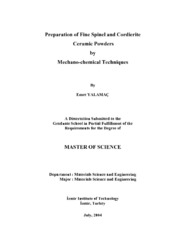Please use this identifier to cite or link to this item:
https://hdl.handle.net/11147/3292Full metadata record
| DC Field | Value | Language |
|---|---|---|
| dc.contributor.advisor | Akkurt, Sedat | en |
| dc.contributor.author | Yalamaç, Emre | - |
| dc.date.accessioned | 2014-07-22T13:51:14Z | - |
| dc.date.available | 2014-07-22T13:51:14Z | - |
| dc.date.issued | 2004 | en |
| dc.identifier.uri | http://hdl.handle.net/11147/3292 | - |
| dc.description | Thesis (Master)--Izmir Institute of Technology, Materials Science and Engineering, Izmir, 2004 | en |
| dc.description | Includes bibliographical references (leaves: 53-56) | en |
| dc.description | Text in English; Abstract: Turkish and English | en |
| dc.description | x, 56 leaves | en |
| dc.description.abstract | Low temperature synthesis of cordierite and magnesium aluminate spinel powders has been attracting attention in recent years due to new potential applications. The use of mechanochemical methods to achieve partial or complete structural disorder as a tool to lower the sintering temperatures has also been increasingly reported. In this study, spinel was produced by intense milling of a mixture of Mg(OH)2 and Al(OH)3. Detailed phase characterization of the synthesized loose powder spinel was performed using XRD and DTA. SEM was used for the analysis of ground powder morphology and particle size. Amorphization was observed after 50 minutes of grinding at 600 rpm. 110 minutes of grinding led to partial growth of spinel. Temperatures less than 1000oC were able to produce spinel powders. In the second part of the study, cordierite was synthesized by mixing proper amounts of various combinations of alumina or Al(OH)3 (as a source of Al2O3), kaolin (as a source of SiO2 and Al2O3), and talc (as a source of MgO and SiO2). Detailed microstructural characterization of the synthesized pellets was performed by using SEM. Other techniques used for analysis of powder products were XRD, DTA and FTIR. One of the four possible mixture combinations was processed by using mechanochemical synthesis. This technique was analyzed by the use of statistical experimental design (SED) in order to understand the effects of process variables on the amount of synthesized product. Temperature was the most important factor and grinding speed-grinding time interaction was the next significant variable. These results were expected because lower grinding speed and longer grinding time generates a similar amount of grinding action compared to higher speeds and lower times. The cordierite mixture was completely amorphized by grinding at 300 rpm for 60 minutes based on XRD peak intensity measurements. Temperatures as low as 1150oC were able to produce cordierite ceramic. In addition to the mechanochemical technique, the effect of additive use and the combined effect of additive use and grinding on cordierite synthesis were also studied. These factors further decreased the synthesis temperature down to about 1050oC. | en |
| dc.language.iso | en | en_US |
| dc.publisher | Izmir Institute of Technology | en |
| dc.rights | info:eu-repo/semantics/openAccess | en_US |
| dc.subject.lcc | TP815 .Y16 2004 | en |
| dc.subject.lcsh | Ceramic powders | en |
| dc.subject.lcsh | Spinel group | en |
| dc.title | Preparation of fine spinel and cordierite ceramic powders by mechano-chemical techniques | en_US |
| dc.type | Master Thesis | en_US |
| dc.institutionauthor | Yalamaç, Emre | - |
| dc.department | Thesis (Master)--İzmir Institute of Technology, Materials Science and Engineering | en_US |
| dc.relation.publicationcategory | Tez | en_US |
| item.languageiso639-1 | en | - |
| item.fulltext | With Fulltext | - |
| item.openairecristype | http://purl.org/coar/resource_type/c_18cf | - |
| item.openairetype | Master Thesis | - |
| item.grantfulltext | open | - |
| item.cerifentitytype | Publications | - |
| Appears in Collections: | Master Degree / Yüksek Lisans Tezleri | |
Files in This Item:
| File | Description | Size | Format | |
|---|---|---|---|---|
| T000434.pdf | MasterThesis | 3.72 MB | Adobe PDF |  View/Open |
CORE Recommender
Page view(s)
158
checked on Jul 22, 2024
Download(s)
110
checked on Jul 22, 2024
Google ScholarTM
Check
Items in GCRIS Repository are protected by copyright, with all rights reserved, unless otherwise indicated.